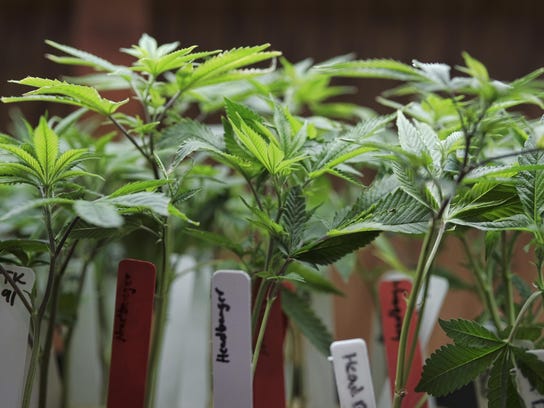 |
| Video provided by NewsyNewslook |
There is no reliable way to test stoned drivers. The consequences could be disastrous.
 |
| Colorado and Washington voted to legalize marijuana in 2012. Colorado now leads the country in past-month marijuana use among 12-17-year-olds with Washington in sixth place.(Photo: AFP/Getty Images) |
The tragedy was horrifying. It might not be isolated.
If New Jersey fully legalizes marijuana under the next governor — a move that frontrunner Phil Murphy supports — there is one nasty side effect we’re ill-equipped to tackle.
In Colorado, weed-related traffic deaths jumped by 48 percent after full legalization there in 2014. The problem: There is no reliable, efficient field test for stoned driving.
“This is not being discussed enough,” said Cathleen Lewis, director of public affairs for AAA Northeast and a Mercer County resident.
So, let’s discuss it, because the stakes could not be higher.
How jail saved a Lacey heroin addict
A litany of lawsuits?
Thanks to the combination of increased education and the deterrence provided by the breathalyzer test (now the Alcotest), drunken driving fatalities in the U.S. have fallen by a third over the past three decades. That’s thousands of lives saved each year.
But marijuana metabolizes much differently than alcohol.
“It (marijuana) does not reach peak inebriation while it’s in your blood stream,” Lewis said. “It does that when it’s in the fatty tissues in your brain. There’s not going to be a good way to test that.”
Yes there are blood tests, urine tests and oral swabs that can determine if someone has pot in their system. But it’s much harder, and more costly, to determine if it got there two weeks ago or two hours ago.
Marijuana plants for sale last month at the ShowGrow dispensary, a medical marijuana provider in downtown Los Angeles. California and other states recently approved recreational pot coming online. (Photo: AP)
“Even if they test your urine or blood, you would need to get an expert to pinpoint the timing,” said Michael Polloway, an attorney who handles DUI cases for the Red Bank firm Polloway & Polloway. “In special cases the state could hire an expert toxicologist. They’re not going to do that on a case-by-case basis. The state doesn’t have the resources to hire a $5,000 expert every time.”The lack of a practical scientific test leaves the determination of impairment to Drug Recognition Experts (DREs) — police officers trained to spot signs of drugged driving.
“The reality is, that’s the best tool we have today,” Lewis said. “The good news is New Jersey has the second-most trained DREs in the country (behind California). The problem is that’s not enough. Even if every police department had one, that one officer isn’t going to work 24 hours a day.”
And those officers’ determinations are more open to scrutiny.
“With the Alcotest, assuming it’s performed correctly, you get a true number. For the most part it’s an objective test,” Polloway said. “With a DRE, these officers are performing a test that really is subjective.”
As an attorney, Polloway said, “When you’re dealing with an officer’s subjective observations, you’re going to take a lot of cases to the mat. It could lead to a backlog in municipal court.”
In other words, the deterrence is weak.
That’s a problem. It’s a problem in Colorado, and it promises to be a bigger problem here, where there are more drivers packed into a much denser map.
On smoking prevention, N.J. earns an 'F'
A pathetic track record
The best remedy is education. That starts with shooting down the big lie pushed by some marijuana advocates.
“There are people who think when you’re high on marijuana, you’re a better driver,” Lewis said. “That’s not true.”
The vast majority of studies indicate weed impairs drivers, albeit to varying degrees. When coupled with even a modest amount of alcohol, the effect is notably more severe.
 |
| Susan Covington of Brick holds a photo of her grandson Brandon Nikola who died of an overdose in October of 2016. Sen. Cory Booker (D-NJ) attends a roundtable discussion at Ocean Medical Center with Ocean County Prosecutor Joe Coronato, the DEA and health care professionals to discuss the opioid crisis. Brick, NJ Saturday, July 29, 2017 @dhoodhood Doug Hood |
In an ideal world, a significant portion of marijuana revenue would bolster enforcement (more DREs) and education. The biggest argument for legalization, after all, is the financial windfall for the state.
Of course, New Jersey has a pathetic track record with such matters. The cigarette tax was supposed to fund anti-smoking initiatives. It doesn’t. Atlantic City’s gaming revenue was supposed to help senior citizens. It didn’t.
Lewis’ organization is trying. AAA is holding an impaired driving summit Dec. 19 in Hamilton. Folks from Colorado will be there, sharing what they’ve learned the hard way.
“Almost every state that has legalized marijuana has not dealt with traffic safety concerns at the same time as legalization,” Lewis said. “That means they are scrambling two, three years later on how to address those concerns.”
New Jersey can learn from Colorado. But first we must acknowledge the obvious: There is a massive downside to lighting up.
The latest "This is your brain on drugs" video can be viewed at the top of this story.
Carino’s Corner appears Mondays in the Asbury Park Press. Contact Jerry at jcarino@gannettnj.com.

No comments:
Post a Comment